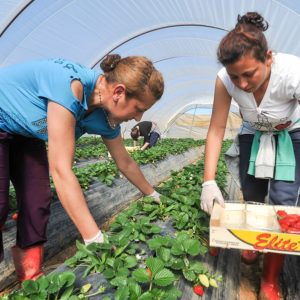The European Union commissioner for the European Green Deal has left, a farmers’ party has taken control of the Dutch senate, French president Emmanuel Macron says regulatory changes shouldn’t be rushed, and the EU’s largest political group is openly opposing reform plans that had been years in the making. It is not looking good for the farm policy reform that the European Union had been promising.
Legislation in Europe either dies a quiet death or goes out with a lot of fanfare. The “Farm to Fork” strategy by the European Union is on track to do the latter. Its flagship proposal to halve the use of pesticides by 2030 and set aside 10 percent of agricultural land to protect biodiversity has hit a brick wall: Austria, Poland and Hungary are stalling negotiations, possibly dragging them out until the European elections next June. The pesticide reduction element of the plans formulated in the Sustainable Use of Pesticide Regulation has faced opposition for practical and political reasons.
Early on, farmers’ groups opposed the law because it would undermine Europe’s food production industry. When the U.S. Department of Agriculture did an impact assessment on Farm to Fork, it found that it would significantly increase agricultural prices and even contract the European economy. That was before the economic effects of COVID-19 had manifested itself fully and before the war in Ukraine had started. Still, the European Commission held firm throughout the mountain of criticism; Green Deal Commissioner Frans Timmermans even said, “We’ve gotten used to food being too cheap.”
Last summer, Netherlands farmers upended European politicians’ illusion that agriculture as a policy area could simply be swept under the rug. Large-scale protests by farmers addressed the issue of nitrogen emissions, which the Dutch government sought to cut to follow EU rules. Livestock farming, responsible in part for those emissions (as is construction and aviation), was explicitly targeted by a buy-out program seeking to reduce by almost a third the number of livestock farms in the Netherlands. Despite that, in their anger, farmers burned hay balls and blocked access to airports, public opinion was on their side. In the recent senate elections in the Netherlands, the Farmers’ Citizen Movement became the strongest party, now set to have a significant say in the policymaking of the country.
The political happenings in the Netherlands served as a wake-up call for political parties across Europe, specifically those on the center-right who had traditionally counted on the support of farmers and now see themselves threatened by the emergence of single-issue farmer parties in elections. Other than protesting, Dutch farmers have shown there is a political angle for them to embark on and that farmers as food providers have a much higher public standard than previously recognized.
Timmermans is now exiting his job to run for prime minister. Given his record on environmental policy, it’s hard to tell whether Dutch voters will give him a chance.
Farmers certainly won’t.
Meanwhile, the center-right European People’s Party is pitching itself as the farmers’ party, even warning that farmland reductions could lead to “global famine” and put “farmers out of business.”
While the last European elections in 2019 gave more leeway to environmentalists, who have tried to implement ambitious targets, it looks as if the realities of the COVID pandemic, the economic troubles that have ensued from it, and the war in Ukraine will be preventing them from following through with their plans. It is likely that we’ll see a shift to the center and center-right and by that standard, a different agricultural policy.
One positive change that has been announced and will land on the negotiating table of the next European Commission is the authorization of gene-edited crops. Until now, the commercialization of new genomic techniques in food production has been virtually impossible. But with those legal changes, Europe will finally catch up to the technological realities of the United States and Canada.
From the perspective of European strategic autonomy, the fact that the Farm to Fork strategy is likely to fail is good news because Europe cannot afford increased food dependence. Both animal feed and fertilizer imports were coming from Ukraine and Russia until the war upended the reliance Europe had on both countries. Reducing the environmental effect of farming by reducing the size of the sector cannot be a forward-looking strategy for Europe.


